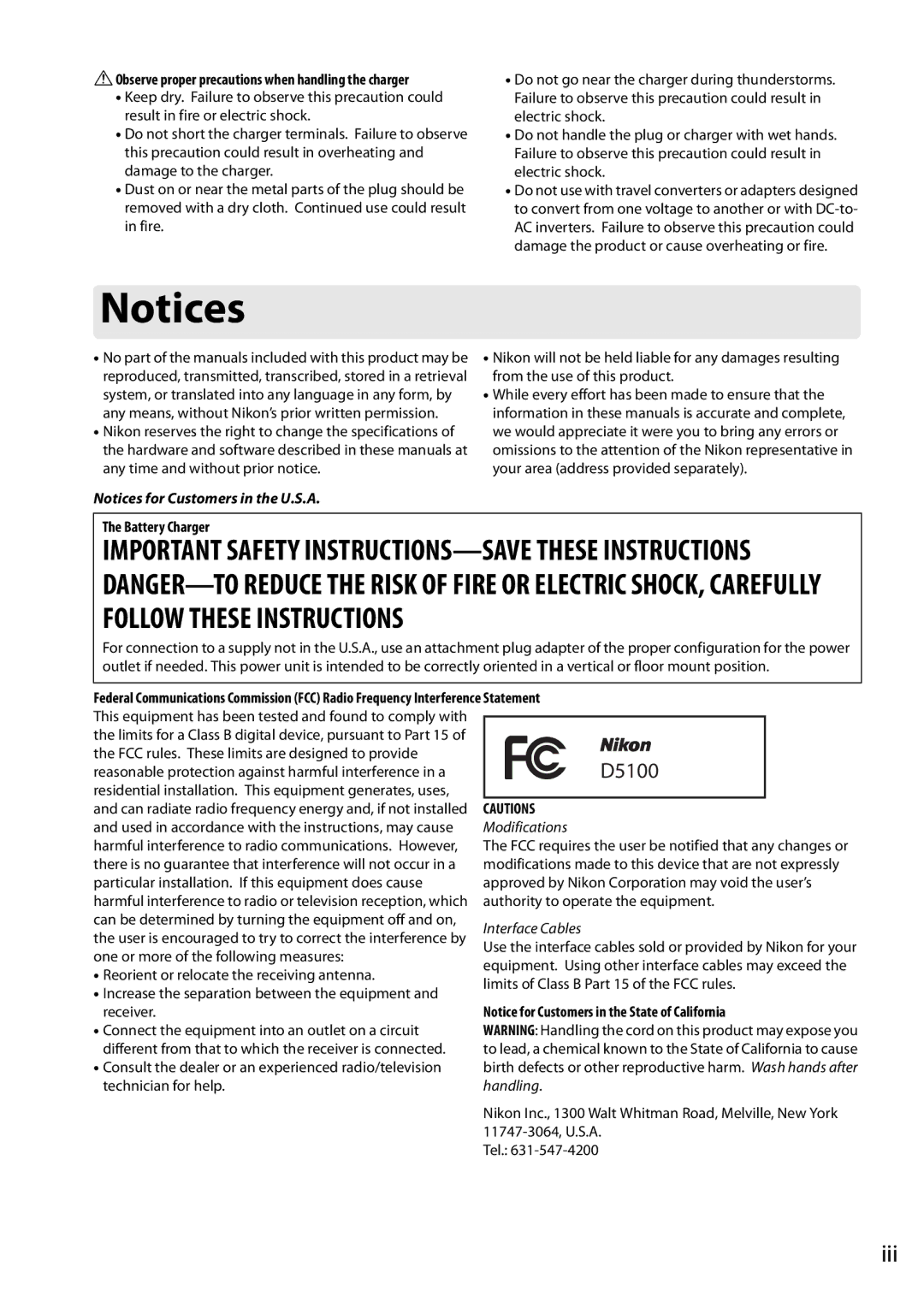
AObserve proper precautions when handling the charger
•Keep dry. Failure to observe this precaution could result in fire or electric shock.
•Do not short the charger terminals. Failure to observe this precaution could result in overheating and damage to the charger.
•Dust on or near the metal parts of the plug should be removed with a dry cloth. Continued use could result in fire.
•Do not go near the charger during thunderstorms. Failure to observe this precaution could result in electric shock.
•Do not handle the plug or charger with wet hands. Failure to observe this precaution could result in electric shock.
•Do not use with travel converters or adapters designed to convert from one voltage to another or with
Notices
•No part of the manuals included with this product may be reproduced, transmitted, transcribed, stored in a retrieval system, or translated into any language in any form, by any means, without Nikon’s prior written permission.
•Nikon reserves the right to change the specifications of the hardware and software described in these manuals at any time and without prior notice.
•Nikon will not be held liable for any damages resulting from the use of this product.
•While every effort has been made to ensure that the information in these manuals is accurate and complete, we would appreciate it were you to bring any errors or omissions to the attention of the Nikon representative in your area (address provided separately).
Notices for Customers in the U.S.A.
The Battery Charger
IMPORTANT SAFETY
For connection to a supply not in the U.S.A., use an attachment plug adapter of the proper configuration for the power outlet if needed. This power unit is intended to be correctly oriented in a vertical or floor mount position.
Federal Communications Commission (FCC) Radio Frequency Interference Statement
This equipment has been tested and found to comply with |
|
| |
|
| ||
the limits for a Class B digital device, pursuant to Part 15 of |
|
| |
the FCC rules. These limits are designed to provide | D5100 |
| |
reasonable protection against harmful interference in a |
| ||
residential installation. This equipment generates, uses, |
|
| |
and can radiate radio frequency energy and, if not installed | CAUTIONS | ||
and used in accordance with the instructions, may cause | Modifications | ||
harmful interference to radio communications. However, | The FCC requires the user be notified that any changes or | ||
there is no guarantee that interference will not occur in a | modifications made to this device that are not expressly | ||
particular installation. If this equipment does cause | approved by Nikon Corporation may void the user’s | ||
harmful interference to radio or television reception, which | authority to operate the equipment. | ||
can be determined by turning the equipment off and on, | Interface Cables | ||
the user is encouraged to try to correct the interference by | |||
Use the interface cables sold or provided by Nikon for your | |||
one or more of the following measures: | |||
equipment. Using other interface cables may exceed the | |||
• Reorient or relocate the receiving antenna. | |||
limits of Class B Part 15 of the FCC rules. | |||
• Increase the separation between the equipment and | |||
|
| ||
receiver. | Notice for Customers in the State of California | ||
• Connect the equipment into an outlet on a circuit | WARNING: Handling the cord on this product may expose you | ||
different from that to which the receiver is connected. | to lead, a chemical known to the State of California to cause | ||
• Consult the dealer or an experienced radio/television | birth defects or other reproductive harm. Wash hands after | ||
technician for help. | handling. | ||
